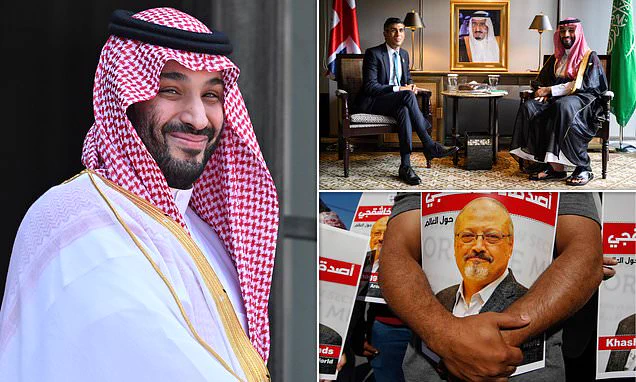Downing Street confirmed that Rishi Sunak spoke to Saudi crown prince Mohammed Bin Salaman earlier today, with both leaders indicating a likely official state visit in autumn. According to news reports, Rishi Sunak told the Saudi crown prince of his desire to meet “at the earliest opportunity.” The two leaders expressed their desire to “continue working closely together,” a Downing Street readout revealed. But the possibility has already sparked outrage as it would be the first official visit since the brutal assassination of journalist Jamal Khashoggi. The Liberal Democrats have accused the government of “rolling out the red carpet to dictators.” Investigations revealed that the Saudi crown prince was pivotal in the journalist’s killing. But the British government appears keen on developing closer relations against a backdrop of Saudi Arabia’s growing influence in the Middle East. The oil-rich nation could be vital in reducing dependency on Russia for oil and gas resources.
Concerns over the crown prince’s human rights record, the de facto leader of the brutal authoritarian regime since 2018, remain. He is believed to have been personally involved in the barbaric assassination of the journalist. According to The Times, the crown prince will meet the Prime Minister and King Charles. iNews reported earlier today that the visit has yet to be confirmed, but the Saudi leader is expected to accept the UK government’s invitation. Last year, the then PM, Boris Johnson, travelled to meet Mohammed Bin Salaman (MBS) to broaden the UK’s energy supply sources.
In the immediate aftermath of the alleged assassination, the international community had diplomatically distanced itself from Saudi Arabia.
Asked about Rishi Sunak’s view of Khashoggi’s killing, the PM’s official spokesperson said:
“From the start, we have been clear that this murder was a terrible crime and that Saudi Arabia must ensure such an atrocity can never happen again.
“We’ve sanctioned 20 Saudi nationals involved in the murder under the global human rights scheme.”
Jamal Khashoggi was an outspoken critic of the Saudi regime. When collecting documents at the Saudi consulate, he is believed to have been brutally murdered. The CIA later concluded that MBS had ordered the assassination, leading to Saudi Arabia’s temporary ostracisation within the international community. The journalist had been critical of Saudi Arabia’s action in the Yemeni war.
But the British government is keen to build stronger ties with the kingdom and attract Saudi investment despite the nation’s abysmal human rights record. Post Brexit, the UK government aims to forge a trade agreement with the Gulf Cooperation Council (GCC), a union of Gulf states, and now wants Saudi support for such a deal.
Meanwhile, Saudi Arabia has been attempting to regain respect and access to leading nations. Last week, it sought inclusion in a joint next-generation fighter jet project between Italy, Japan and the UK. The UK and Italy appear open to Saudi participation, but Japan is not.
Opposition to an official visit is likely to be vehement
Human rights organisations, alongside the opposition, are likely to oppose an official visit strongly. Saudi Arabia’s human rights violations, stance on women and the LGBT+ community, and accusations of violence and extrajudicial killings have led to calls for Saudi’s continued exclusion.
Lib Dem MP Alistair Carmichael told iNews:
“What is the point in boasting about our energy independence one week if you then go cap-in-hand to the murderous regime in Saudi Arabia the next? Rolling out the red carpet to dictators shows just how weak our government has become.
“When Boris Johnson went to Saudi Arabia last year, he was welcomed with a swathe of public executions – a symbol of how little our government’s posturing over human rights matters to the crown prince. We can expect the same shameful spectacle to play out again.”
Labour deputy leader Angela Raynor told the BBC:
“It’s important as part of that visit that the prime minister speaks to him about human rights.
“Part of our role internationally is to challenge other nations… and to try and influence in that way. If you don’t, then you don’t have any influence whatsoever.”
Apart from his supposed involvement in the Khashoggi assassination, the Saudi crown prince is believed to have forced hundreds of political opponents to relinquish their wealth and, in some cases, leave Saudi Arabia.
Amnesty International’s Polly Truscott said:
“There must be no question of the UK rolling out the red carpet for Mohammed bin Salman or of the Saudi ruler being able to use this visit to rehabilitate himself on the world stage.”




